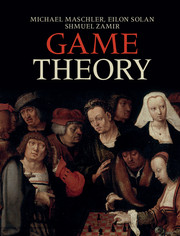Book contents
- Frontmatter
- Contents
- Acknowledgments
- Notations
- Introduction
- 1 The game of chess
- 2 Utility theory
- 3 Extensive-form games
- 4 Strategic-form games
- 5 Mixed strategies
- 6 Behavior strategies and Kuhn's Theorem
- 7 Equilibrium refinements
- 8 Correlated equilibria
- 9 Games with incomplete information and common priors
- 10 Games with incomplete information: the general model
- 11 The universal belief space
- 12 Auctions
- 13 Repeated games
- 14 Repeated games with vector payoffs
- 15 Bargaining games
- 16 Coalitional games with transferable utility
- 17 The core
- 18 The Shapley value
- 19 The bargaining set
- 20 The nucleolus
- 21 Social choice
- 22 Stable matching
- 23 Appendices
- References
- Index
10 - Games with incomplete information: the general model
- Frontmatter
- Contents
- Acknowledgments
- Notations
- Introduction
- 1 The game of chess
- 2 Utility theory
- 3 Extensive-form games
- 4 Strategic-form games
- 5 Mixed strategies
- 6 Behavior strategies and Kuhn's Theorem
- 7 Equilibrium refinements
- 8 Correlated equilibria
- 9 Games with incomplete information and common priors
- 10 Games with incomplete information: the general model
- 11 The universal belief space
- 12 Auctions
- 13 Repeated games
- 14 Repeated games with vector payoffs
- 15 Bargaining games
- 16 Coalitional games with transferable utility
- 17 The core
- 18 The Shapley value
- 19 The bargaining set
- 20 The nucleolus
- 21 Social choice
- 22 Stable matching
- 23 Appendices
- References
- Index
Summary
Chapter summary
In this chapter we extend Aumann's model of incomplete information with beliefs in two ways. First, we do not assume that the set of states of the world is finite, and allow it to be any measurable set. Second, we do not assume that the players share a common prior, but rather that the players' beliefs at the interim stage are part of the data of the game. These extensions lead to the concept of a belief space. We also define the concept of a minimal belief subspace of a player, which represents the model that the player “constructs in his mind” when facing the situation with incomplete information. The notion of games with incomplete information is extended to this setup, along with the concept of Bayesian equilibrium. We finally discuss in detail the concept of consistent beliefs, which are beliefs derived from a common prior and thus lead to an Aumann or Harsanyi model of incomplete information.
Chapter 9 focused on the Aumann model of incomplete information, and on Harsanyi games with incomplete information. In both of those models, players share a common prior distribution, either over the set of states of the world or over the set of type vectors. As noted in that chapter, there is no compelling reason to assume that such a common prior exists. In this chapter, we will expand the Aumann model of incomplete information to deal with the case where players may have heterogeneous priors, instead of a common prior.
- Type
- Chapter
- Information
- Game Theory , pp. 386 - 439Publisher: Cambridge University PressPrint publication year: 2013



